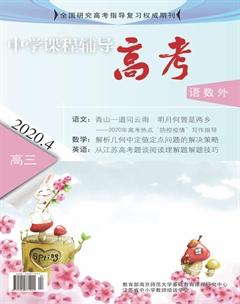从江苏高考题谈阅读理解题解题技巧

按照高中英语课程标准,英语阅读教学的目的是:培养阅读策略,建立语感,特别强调培养学生在閱读过程中获取和处理信息的能力。2020年江苏省高考英语考试纲要要求:考生能够读懂书、报、杂志中关于一般性话题的简短文段以及公告、说明、广告等,并能从中获取信息。要求考生能够理解主旨要义,理解文中具体信息,根据上下文推断单词和短语的涵义,作出判断和推理,理解文章基本结构,理解作者的意图、观点和态度。
阅读理解考点涵盖细节理解、推理判断、主旨大意和语义猜测等几个方面,从近几年江苏高考试题来看,阅读理解命题有如下趋势:题材多样,体裁越来越多样化,体裁涵盖应用文、说明文、记叙文、议论文等;阅读材料选材丰富、原汁原味,具有浓郁的时代气息,突显最新科技,彰显人文理念,涉及社会、科学、政治经济、旅游环保、历史人文、人物故事等各个领域。从考查的角度看,主要考查学生如下能力:细节理解能力、推理判断能力、归纳语篇主旨大意和猜测语义的能力。
结合上表可以发现,近三年来江苏高考阅读理解对细节理解题和推理判断题考查的比重大,归纳主旨大意题次之,猜测语义题数目近几年相对稳定。其中细节理解题是考查考生阅读理解能力的一个重要方面。简单的细节查找题,考生往往能够直接定位题干中的关键词,到文中查找相关信息就可以解答,而一些间接信息题往往需要考生结合同义、近义表达将题干中的关键词进行替换,甚至有的数字计算题还需要考生结合查找出的事实细节进行具体计算,这都体现了细节理解题考查层次的复合性。
详细分析近几年江苏高考试题,不难发现,细节理解题由从前的简单寻找信息转向综合考查多层次信息,选项设置也常常具有较大干扰性、迷惑性。有时干扰项会将原文信息夸大,或者陈述的内容与原文意义相反,有时利用某个词或短语的字面含义代替其在特定语境中的具体意义,有的干扰项比较狡猾,会使用与原文相似的表达,但在某些细节处偷梁换柱。对此类题目,我们往往可以采用排除法,结合干扰项常见特点,排除答非所问、不符逻辑、与文章内容相反或者矛盾的选项,排除以偏概全、无中生有的选项,利用同义转换或者反义信息,对照原文关键信息作答。
例如:If you desire physical activities, you can choose activities from swimming to horse riding. Explore the heights with Go Ape, the high wire forest adventure course, or journey beneath the earth at Pooles Cavern. And dont forget: we are surrounded by a natural playground just perfect for walking, caving, climbing and cycling... (2019年江苏卷)
Q: If you want to take an underground journey, which place is the best choice?
A. Pooles Cavern. B. Pavilion Gardens.
C. Buxton Museum D. Green Man Gallery
解题技巧:根据题干中的关键词“underground journey”定位文中与问题相关信息“...or journey beneath the earth at Pooles Cavern”,可以发现,“journey beneath the earth”与题干中“underground journey”同义。因此选A。
推理判断题也是近年来阅读理解考查的重点,对比近三年江苏高考题,看似题量在减少,实际上难度在提升。此类题要求考生在彻底理解文章的基础上,根据文章内容,对文章信息进行加工处理,通过分析、综合等深层思维处理,进行符合逻辑的推理,推断出作者的“言外之意”。推理判断题按照其设问方式,常常分为:写作意图推断题、文章来源或读者对象推断题、态度观点评述性推断题等。
例如:Even more worryingly, the fascination with the Internet by people in rich countries has moved the international community to worry about the “digital divide” between the rich countries and the poor countries. This has led companies and individuals to donate money to developing countries to buy computer equipment and Internet facilities. The question, however, is whether this is what the developing countries need the most. Perhaps giving money for those less fashionable things such as digging wells, extending electricity networks and making more affordable washing machines would have improved peoples lives more than giving every child a laptop computer or setting up Internet centres in rural villages. I am not saying that those things are necessarily more important, but many donators have rushed into fancy programmes without carefully assessing the relative longterm costs and benefits of alternative uses of their money.(2019年江苏卷C篇)
Q: The example in Paragraph 4 suggests that donators should .
A. take peoples essential needs into account
B. make their programmes attractive to people
C. ensure that each child gets financial support
D. provide more affordable internet facilities
解题技巧:本题属于态度评判类推断题,利用作者举例来推断作者对donators应该采取的行动作出的评判,结合文中“Perhaps giving money for those less fashionable things such as digging wells, extending electricity networks and making more affordable washing machines would have improved peoples lives more than giving every child a laptop computer or setting up Internet centres in rural villages”列举出的具体事例可知,作者认为好的捐赠应该考虑人们的基本需要, 因此选A。
语义猜测题,主要考查考生的语言素养,突出考查考生对语境的分析和理解。高考阅读理解主要考查考生结合上下文语境,利用构词法知识猜出生词词义或熟词新意的能力。应对这类考题,考生需要储备充足的构词法知识,既要积累前缀、后缀、派生词、合成词等知识,又能结合语境判断,找准代词的就近指代对象,利用逻辑关系分析,结合前后文举例,甚至利用符号意义,找出替代描述对象。
例如:Lighting matters, too. When Berlin restaurant customers ate in darkness, they couldnt tell how much theyd had: those given extralarge shares ate more than everyone else, but were none the wiser—they didnt feel fuller, and they were just as ready for dessert.(2018年江苏卷B篇)
Q:The underlined phrase “none the wiser” in paragraph 3 most probably implies that the customers were .
A. not aware of eating more than usual
B. not willing to share food with others
C. not conscious of the food quality
D. not fond of the food provided
解题技巧:通过上下文,结合连词以及语境来判断。解答本题时,考生需要联系前文信息:“those given extralarge shares ate more than everyone else”他们吃得比其他人多,结合后面的“but”,以及“they didnt feel fuller”可知,划线部分意思是他们没有意识到自己比平时吃得多,因此选A。
有时词义猜测题考查的词汇是我们比较熟悉的词,但是需要我们结合不同的語境去理解其具体含义。例如:
When I was 12, all I wanted was a signet (图章) ring. They were the “in” thing and it seemed every girl except me had one.
Q: The word “in” probably means “ ”.
A. fashionable B. available
C. practical D. renewable
解题技巧:本题中“in”看起来是很简单的词汇,但是需要考虑and连接的并列句所指代的内容,由“every girl except me had one”可以得知这里“in”的意思是“很流行”。这里They were...是对前面a signet ring的进一步解释,解题时需要关注此类同位语(从句)表达,尤其关注or, and, that is (to say), in other words, namely等词后面的解释。
归纳主旨大意类的题目常常考查考生的归纳概括能力,测试考生对语篇的深层理解,往往是针对某一语段或者对于一整篇文章的大意或者写作目的等设题,或者是要求考生选择合适的标题。这一深层理解思维活动需要考生找准文章主题句,理顺逻辑,挖掘文本深层信息,把握作者观点、态度,避免主观臆断、断章取义或者以偏概全。对于一些主题句不太明显的文章,同学们解题时需要抓住关键词,关注一些在文中出现频率较高的词,有时以同义复现的形式出现的一些词,很可能就是蕴含主旨涵义的关键词。
各种语篇承载着各式语言表达,提供了不同的话题和语境,阅读不同的行文结构和语言风格的文章是同学们发展思维和提升学习能力的重要途径。熟练掌握不同类型题目的解题策略,有助于我们提高阅读效率,养成良好的思维习惯,提升学科素养。
(作者:陈晶晶,江苏省如皋市第一中学)

